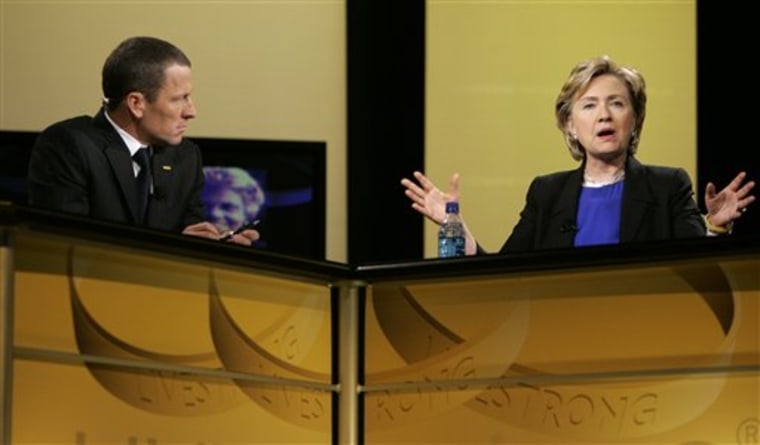John Edwards and Hillary Rodham Clinton tussled over accepting campaign contributions from powerful health care groups Monday at a forum on cancer that attracted four Democratic hopefuls.
Each candidate spoke separately at the Iowa event, with Edwards and Clinton focused on the ongoing debate among the party's top-tier rivals over accepting campaign donations from lobbyists.
Clinton has refused to forsake such donations. Edwards doesn't accept money directly from federal lobbyists, but he is not above benefiting from the broader lobbying community, accepting money from firms that have lobbying operations.
Clinton defended her decision to accept campaign contributions from health care groups, saying she has a long track record of fighting for national health care that demonstrates she's not influenced by special interest giving.
"My record shows I've been very effective in that," the New York senator said. "I believe in working with everybody and being influenced by nobody."
Different lessons
Edwards warned that powerful interest groups killed efforts to create universal health care when Clinton was first lady and spearheaded the effort of her husband's administration.
"I think the lesson from that, my lesson, is not the same as hers," Edwards said. "Her lesson is give them a seat the table. I think if you give the drug companies, insurance companies and their lobbyists a seat at the table, they'll eat all the food."
In the early 1990s, Clinton tried to reshape the nation's health care system - an audacious effort that collapsed under its own complexity, Republican opposition and the Clintons' unwillingness to seek compromise with lawmakers.
"I intend to do everything I possibly can to be the president who signed into law national health care," Clinton said Monday.
More funding, less politics
Meeting with reporters, Edwards sought to underscore the differences with his rival, who is now running even with him in Iowa polls. Clinton left immediately following her appearance at the cancer forum.
"There's a fundamental difference between Senator Clinton and myself about how we bring about the change we need," Edwards said. "We have to take their power away from them. I don't believe we can compromise with them."
All four candidates stood together in calling for more money for cancer research and criticizing President Bush for allowing political philosophy to dictate decisions on scientific research.
Clinton vowed to double spending on research over 10 years, but saved some of her sharpest words for Bush.
"The president of the United States has been leading an assault on science and research," Clinton said. Edwards called Bush the "most anti-science president in history."
Edwards said he will take a back seat to no one in combatting cancer, motivated by his wife's battle with the disease.
New Mexico Gov. Bill Richardson and Rep. Dennis Kucinich of Ohio also participated in the forum sponsored by champion bicyclist Lance Armstrong, himself a cancer survivor.
Richardson noted that former President Nixon declared war on cancer more than 30 years ago, and he joined his rivals in suggesting that money being spent on the war in Iraq be diverted back home.
"We're not doing too well in that war," Richardson said. "This president wants a surge in the war in Iraq. I want a surge in the war on cancer."
